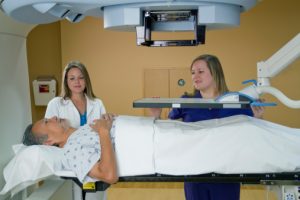
Radiotherapy or – as many call it – radiation, uses high-energy particles or waves to destroy cancer cells. There are different types of radiotherapy. Doctors will decide on the best approach based on each individual case. Sometimes, a patient even gets more than one type of radiation therapy treatment for the same cancer.
Now, an analytical review led by a team of researchers at the University of Toronto in Canada concluded that radiotherapy is linked to a higher risk of developing secondary bladder, rectal, and colon cancers.
The researchers reviewed 21 studies on cancer patients who went through radiotherapy. They also looked at 13 studies that focused on people treated with surgery as controls. The experts were then able to examine the dates of exposure to radiation and any development of a secondary cancer. They found that radiation exposure increased risks of bladder cancer with an odds ratio 0.1 to 3.8 percent, colorectal cancer – 0.3 to 4.2 percent, and 0.3 to 1.2 percent for rectal cancer. Although these numbers are low, the results were consistent when the Toronto researchers restricted their analysis to studies of five- and 10-year lag periods between treatment and the development of secondary cancers.
Some experts believe the study demonstrates the need for more discussion with patients who are making decisions about treatment. However, others in the medical community are quick to point out that since the numbers are low, the concern for secondary cancers, including colon cancer and bladder cancer risks, should not stand in the way of men with higher grade prostate cancer who can benefit from radiotherapy.
Another point that was made following the researchers’ analysis was that patients with malignancies should be followed more closely than other patients. During follow-ups, any signs and symptoms should immediately prompt additional tests to determine whether or not another premalignant or malignant conditions have developed.
Prostate cancer treatment side effects
Radiation for prostate cancer has saved lives in many cases. It is still important though to understand that radiotherapy has side effects, which can be different depending the type of radiotherapy.
Thanks to the technological developments, advances in research, and improved delivery of treatment, many people who suffer from prostate cancer go on to live happy, productive lives. Many worry about the possible side effects of the disease and treatment only to discover that they managed just fine. Others do experience some side effects regardless of the form of treatment.
It’s important to be familiar with the possible side effects if you or someone you care about has been diagnosed with prostate cancer. This is not meant to make you panic since, again, not everyone experiences all these effects. It is good to be aware in the event that one or more of the following signs do appear following the treatment:
- Urinary dysfunction
- Bowel dysfunction
- Erectile dysfunction
If any of these problems arise, medical attention should be sought.
Prostate cancer traditionally grows slowly and remains confined to the prostate gland in the beginning. While some types of prostate cancer may not require immediate treatment, other types are aggressive and spread quickly. When it is still confined to the prostate gland and is detected early, the chances of successful treatment are much better.
Prostate cancer can be serious. One in thirty-nine men will die of this form of cancer. Still, most men who are diagnosed with prostate cancer do not succumb to it. Statistics show that over 2.9 million men in the United States who have been diagnosed with prostate cancer are still alive today. Quick diagnosis and proper treatment is key.
Related Reading:
The prostate cancer 2016 update has thrown a new light on the link between colon cancer and radiation, and hormone therapy for prostate cancer treatment. According to a new research, treatment of prostate cancer via radiation could increase the risk of other cancers in men. Continue reading…
Prostate cancer survivors face increased risk of developing heart disease
Prostate cancer survivors face increased risk of developing heart disease. The three million prostate cancer survivors in the U.S. are more likely to die of another illness. But early detection can prevent early death and improve mortality outcomes. The biggest concern for prostate cancer survivors is heart disease. Researchers have focused on modulating the risk factors for cardiovascular disease in men, especially those receiving androgen deprivation therapy (ADT) to treat prostate cancer, as it has been linked with higher rates of heart disease. Continue reading…
Sources:
http://www.medpagetoday.com/HematologyOncology/ProstateCancer/56583
http://www.pcf.org/site/c.leJRIROrEpH/b.5822789/k.9652/Side_Effects.htm
http://www.cancer.org/cancer/prostatecancer/detailedguide/prostate-cancer-key-statistics
http://www.cancer.org/cancer/prostatecancer/detailedguide/prostate-cancer-treating-radiation-therapy